The Daily Agenda: Taking the show on the road
Safety dialogues go around Arizona … Guerrilla community safety … Pima County Attorney Laura Conover eyeing second term.
We told you last month about how 1,200 Tucsonans weighed in on ideas about creating safety that don’t involve the criminal justice system through Just Communities Arizona’s “Reimagining Community Safety” survey.
While the survey focused on Tucson, Just Communities’ home base, the group is now taking its message on the road in a series of community dialogues intended to change the larger narrative about public safety.
The first event kicked off at the University of Arizona last week, and they’re heading to Arizona State University today at 5:30 p.m. and then to Northern Arizona University next Tuesday.
Hosting events throughout Arizona gives Just Communities the opportunity to showcase the different ways that groups and individual people are already improving safety around the state independent of the justice system, including through violence reduction strategies grounded in public health, community gardens that bring people together and neighborhood-driven promotion of health and education equity (all topics that will be discussed at the ASU and NAU sessions).
“This is a narrative change effort, so we’re trying to change people’s definition of safety and what they think safety looks like to them,” said Executive Director Caroline Isaacs. “That’s a tough job, because we’ve been conditioned to have an extremely narrow belief that safety involves law enforcement and is reactive to harm.”
Mayor Regina Romero opened Tucson the event before turning the microphone over to local organizers, including Earnest House founder Danny Howe.
Howe has helped offset 85,000 individual nights of homelessness since opening the for-profit Earnest House in 2016, while also creating a sustainable model for transitional housing, he told us.
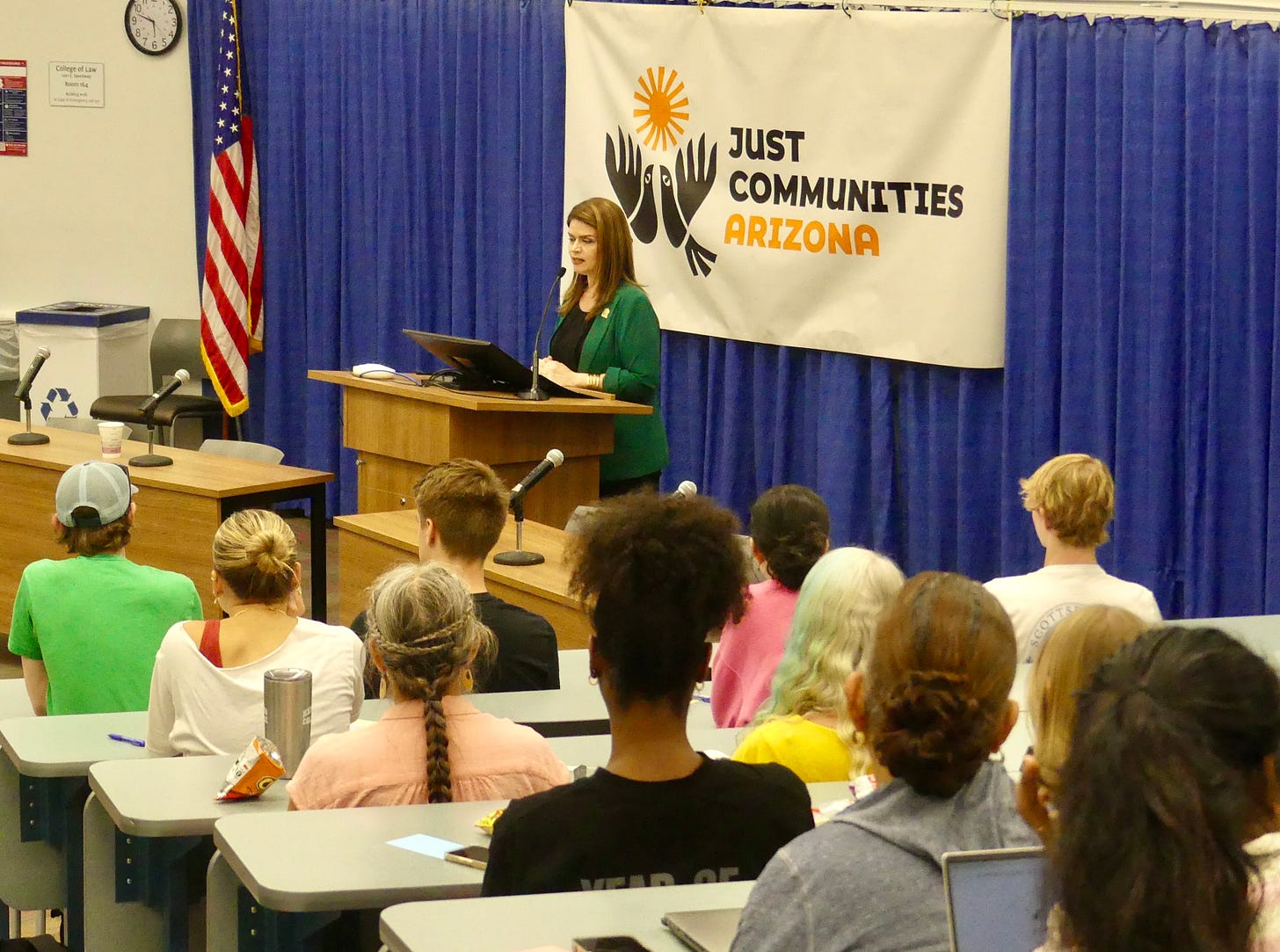
While some beds are reserved and paid for by the county’s Jail Population Review Committee, which assesses inmates’ status and identifies safe and effective release conditions, other residents pay $20 per day. This includes a safe place to stay with amenities for cooking and laundry, regular group meetings and on-site services.
The Earnest House almost always has a wait list, which is part of the reason Howe decided to expand his efforts. He recently launched the nonprofit Howe Project, which provides housing, employment and transportation for people facing barriers, often because of previous incarceration.
“We just don’t want to have to tell anybody ‘No,’” Howe said. “Just to be able to expand and grow, that nonprofit would be able to help us get some additional support and sponsorships.”
Through his new nonprofit, Howe will be able to apply for grants that were not otherwise available and support the Earnest House, along with other groups working with similar populations, through funding, workshops and more.
The dialogue tour is connected to other steps of Just Communities’ post-survey work, such as community safety incubator projects, which Isaacs describes as “guerrilla community safety.”
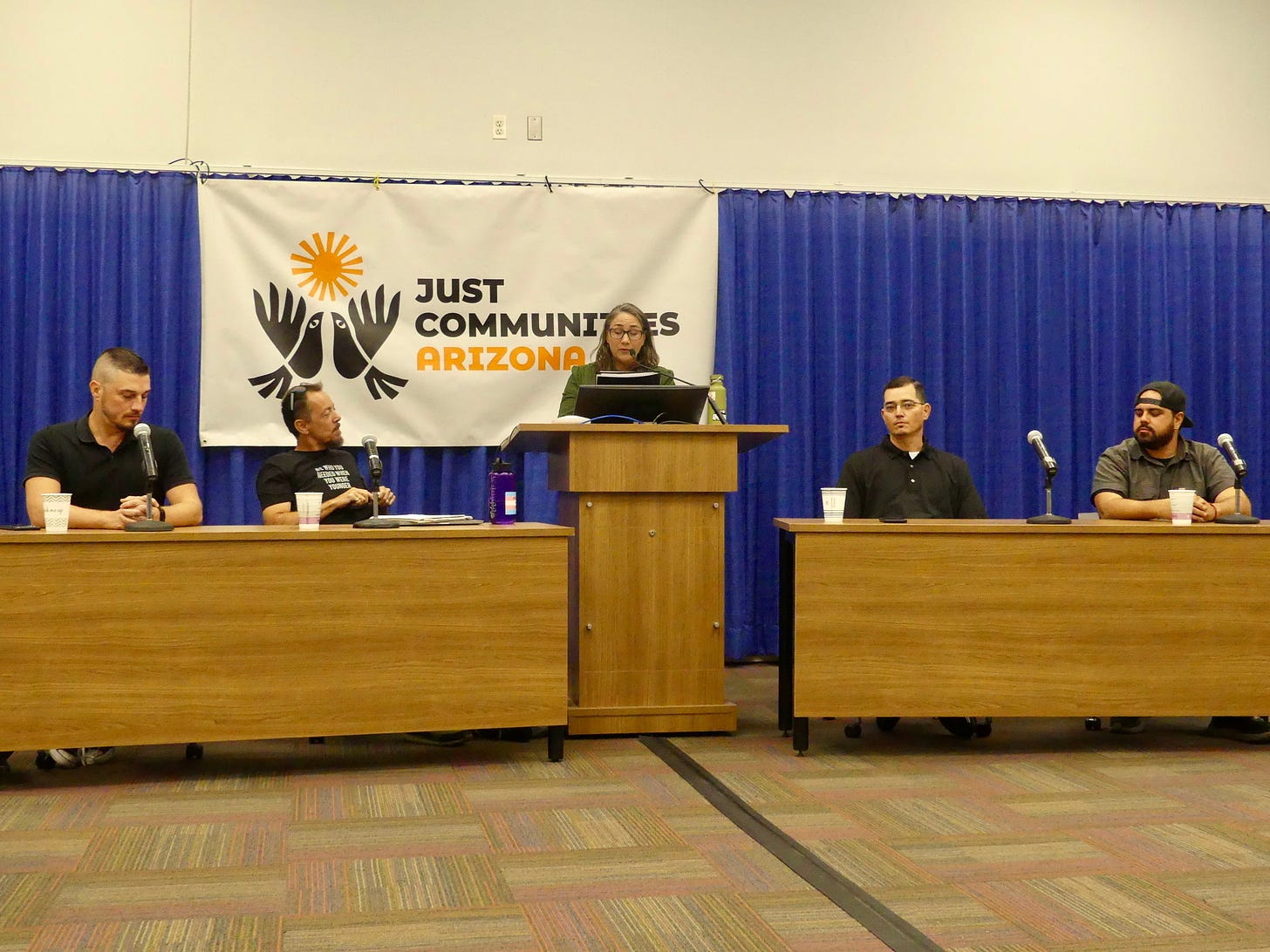
These are projects that don’t involve getting city approval, fundraising or passing an ordinance. They’re small, community improvement projects that neighborhoods can tackle on their own with a little bit of money, which the City of Tucson has stepped up to provide.
The Tucson Agenda is also a small, community improvement project of sorts. How about upgrading to paid so we can keep going?
The first project is underway in the Fairgrounds neighborhood on the city’s south side. Neighbors selected their projects and received a stipend for their time, labor and supplies. They had a party in Mariposa Park last month and painted pots, planted flowers and other greenery and made signs encouraging drivers to slow down.
“There are all these paths to producing safety,” Isaacs said. “Communities know what they need. They just need to be given the resources and access, and then we get the hell out of the way.”
Isaacs also plans to reach out to City Councilmember Lane Santa Cruz, whose participatory budgeting project we wrote about last week, to see if any widely supported community proposals didn’t make the cut to receive funding.
While work is already underway in Tucson to redefine what it means to be safe, Isaacs said these efforts have to move beyond our own backyard in order to truly change the narrative.
Just Communities is taking more than just its narrative change effort outside of Tucson. It’s also taking its expertise in holistic community safety to the Maricopa County Health Department, where it will serve as fiscal manager for its Justice Reinvestment Fund.
When voters legalized recreational marijuana in Arizona in 2020, a Justice Reinvestment Fund was created to set aside 10% of marijuana-related fees and taxes.
Most of the money will be used by county health departments and the Arizona Department of Health Services to address public health issues, but the remainder is earmarked for grants to organizations that run justice reinvestment programs that aim to reduce the prison population and help people who have been incarcerated.
In March, the state opened applications for the first round of state marijuana funds to be used for justice reinvestment programs, netting nearly $6 million across the state.
Requests for proposals opened on Monday for $175,000 in funding, and Isaacs said she’s excited to see what kinds of projects and program ideas will be submitted.
“We have to shift how we think about these things, and that really seems to resonate with people,” Isaacs said. “This is energizing. We can feel the way people respond.”
Drafting a plan: The Tucson City Council, City Attorney’s Office and Tucson Police Department will spend the next 45 days coming up with recommendations and funding needs to address the illegal street racing we wrote about Monday. City officials discussed the issue during Tuesday’s study session, with TPD Chief Chad Kasmar saying that while enforcement is important, so is educating the public about the safety and legal risks of participating in or even watching illegal races or street takeovers. The city is considering using photo enforcement and other technology that would help identify participants and return with a potential plan in early December.
Election day approaching: The Arizona Luminaria’s Becky Pallack penned a comprehensive guide to Tucson’s mayoral race between Democratic incumbent Regina Romero and challengers Janet Wittenbraker, Ed Ackerley and Arthur Kerschen. The Luminaria has also created voter guides for the council election, breaking down the Ward 2, Ward 4 and Ward 1 races.
Looking for answers: The University of Arizona announced Tuesday the creation of the Arizona Astrobiology Center, which will bring together more than 40 faculty members from four colleges and 13 disciplines to research life’s beginnings and our place in the universe, UA News’ Mikayla Mace Kelley writes. The center will house cutting-edge research, train future leaders and encourage collaborations with communities about the existence, origin and evolution of life in the universe.
Seeking re-election: Pima County Attorney Laura Conover announced Wednesday her plans to seek a second term in office. Conover touted her achievements, including ending the death penalty and launching what she said was the state’s first restorative justice program. Her priorities if she’s elected for a second term include reducing gun violence and “leaning heavily into juvenile justice,” as the county is seeing an uptick in younger defendants with more serious charges.
What he said: Arizona Rep. Juan Ciscomani voted twice to make Rep. Jim Jordan, one of the organizers of the coup attempt that involved throwing out Arizonans’ votes in the 2020 election, to be Speaker of the House, Sentinel columnist Blake Morlock writes. Ciscomani, the GOP lawmaker representing parts of Tucson and southeastern Arizona, gave his “tacit endorsement” to Jordan’s attempt to overthrow a duly elected president.
“Sorry. Ciscomani cannot be trusted to side with the U.S. Constitution when the time comes and the pressure mounts,” Morlock writes.
No surprise here: Campaign finance reports for Tucson’s mayoral and council races show Democratic candidates crushing their opponents in fundraising, the Sentinel’s Jim Nintzel reports. That has been the pattern throughout this year’s campaign.
$255,997,918: The dollar amount generated by tax revenue from marijuana sales since its legalization in Arizona in 2020 through the end of 2022.


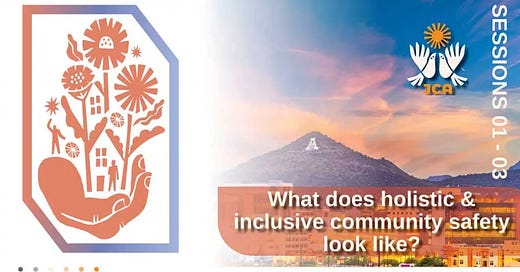


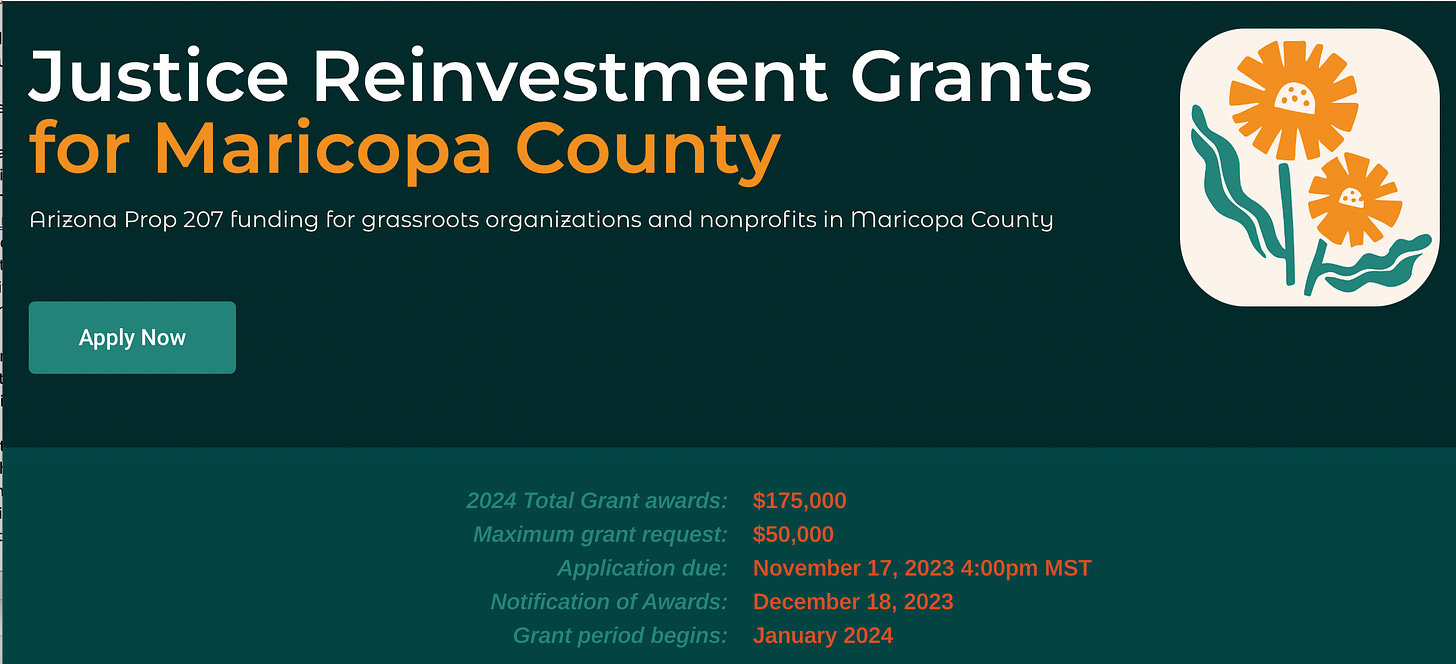

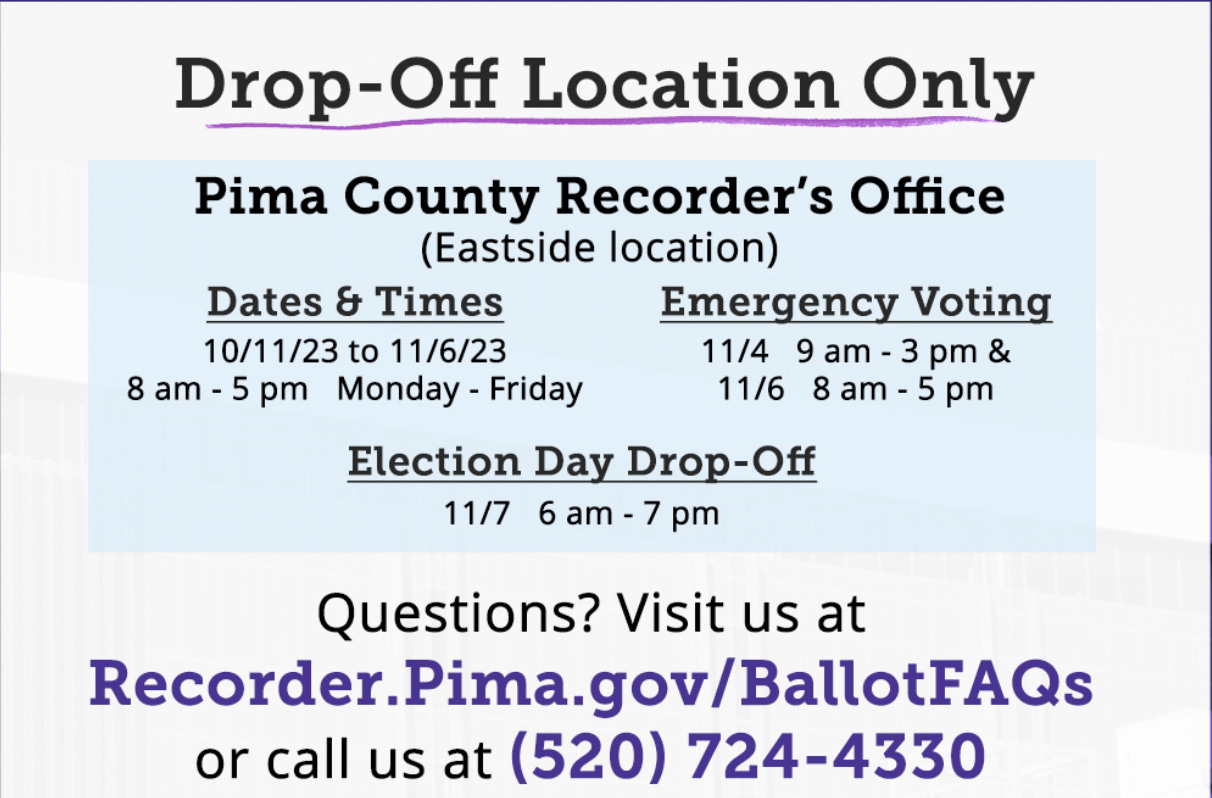

I'm glad to see some scrutiny of Juan Ciscomani and his votes. I don't know if he voted for Jordan because he truly believes that Jordan should lead the GOP in the House (a scary proposition) OR because he just wants to go along to get along (no spine). In either case, I hope the voters of CD 6 turn him out in Nov. 2024.